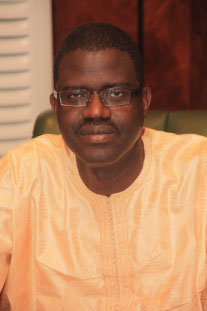
Njogu Bah earlier made the application after telling the court the three ways in which he received directives.
Dr Bah, Lamin AMSJobarteh, former Attorney, and Pa Harry Jammeh, former Solicitor General, are being tried on a three-count charge which included conspiracy to carry out a lawful purpose by an unlawful means, giving false information to a public officer, and abuse of office, charges they denied.
Delivering the ruling, Justice Nkea spoke of an objection taken in terms of Section 192 (3) and 214 of the Evidence Act, against the attempt by the 3rd accused to introduce fresh evidence during re-examination.
“Having carefully read through the provisions of these sections of the Evidence Act, and having carefully examined the submissions in support of the opposite positions taken by both sides, it seems to me that only one issue stands out for determination at that point, and that is when can fresh evidence be admitted by court during the reexamination?” the judge asked.
“To resolve the above question, I found it necessary to reproduce the provision of section 192 (3) of the Evidence Act, and it provides thus: “The reexamination shall be directed to the explanation of matters referred to in cross-examination, and if new matter isby permission of court introduced in reexamination, other party may further cross-examine upon that fact.”
From the foregoing, he continued, there were two issues inherent in this subsection, and the first: it was clear that once a witness has been cross-examined, he may be reexamined on matters contained in his answers to questions given during cross-examination.
Secondly, a new issue, question, or evidence on matters not dealt with during cross-examination may be allowed by the court in its discretion.
Under cross-examination, Justice Nkea went on, the witness stated the three ways in which he purportedly received directives.
The witness had also explained that in the instant case, he took notes of the purported directives in his private diary, and it was this private diary that the 3rd accused now seeks to tender as evidence in court, added the judge.
He said being a fresh matter, the personal diary of the 3rd accused could only be admissible under Section 192 (3) of the Evidence Act by the court in the exercise of its discretion, and in the exercise of this judicial discretion, the court must act both judicially and judiciously.
“It is judicial when the issue is founded on law and judicious when all the particular circumstances of the case are taken into consideration. I must add that a piece of evidence is not admissible as a matter of course by the court,” he said.
“It is my view that to be admissible, the fresh piece of evidence sought to be tendered must be sufficiently relevant to a fact in issue so as to meet the threshold of Section 3 of the Evidence Act, and this may answer the lone question for the determination formulated above,” the judge stated.
The 3rd accused, he continued, has alleged that he was issued with (official) directives to issue exhibit E, as such any official record in any official diary, ledger, folder, file, or book that support this assertion was in his view sufficiently relevant to the fact in issue.
“I do not see how entries in a private diary which has been in the personal custody of the 3rd accused from the inception of this suit can be relevant in supporting the purported official transaction of matters now on trial,” he continued.
“I say so because being a private diary, there are multiple possibilities of the dates. Times and place where such entries were made this court cannot therefore conclude with any degree of certainty, the time, date, or place where such entries in the diary were made,” he added.
He said to this extent, the entries in the diary are shrouded in doubts and by these doubts arising from the numerous possibilities under such entries could have been made.
“I hold that the entries or purported entries in the private diary of the 3rd accused cannot pass for evidence in support of any official business.
The diary sought to be tendered would not in my view add any value to the issue on trial,” he continued.
“To that extent, therefore, it is my humble view that the diary sought to be tendered is not sufficiently relevant, and therefore does not pass the threshold of Section 3 of the Evidence Act,” he stated.
“It is above this reason that, I will accordingly uphold the objection of Mr Kulo, and in the same breath, I overruled the application,” he declared.



